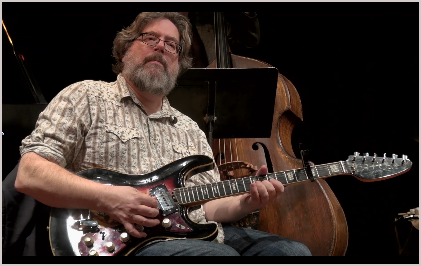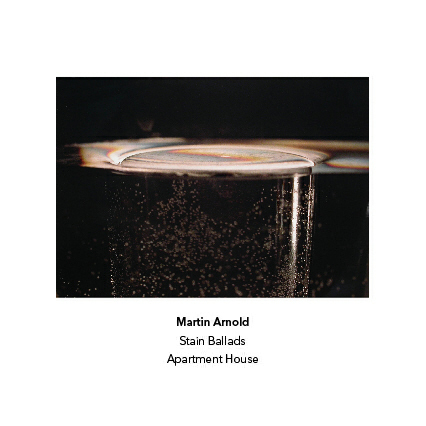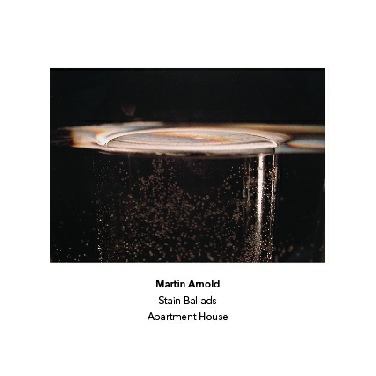Another Timbre TimHarrisonbre
at165 Martin Arnold - ‘Stain Ballads’
Apartment House play four chamber works by the Toronto-based composer Martin Arnold
1. ‘Lutra’ (2017) 16:37 youtube extract
Anton Lukoszevieze cello, humming
2. ‘Stain Ballad’ (2016) 12:58 youtube extract
Anton Lukoszevieze, cello Philip Thomas, piano
Bridget Carey, viola Gordon Mackay & Hilary Sturt, violins
Kerry Yong, reed organ Simon Limbrick, percussion
3. ‘Trousers’ (2017) 22:03
Anton Lukoszevieze, cello Mira Benjamin, violin
4. ‘Slip’ (1999) 14:40
Anton Lukoszevieze, cello Mira Benjamin, violin
Heather Roche, bass clarinet Mark Knoop, piano
Interview with Martin Arnold
First of all, the disc title: what are ‘Stain Ballads’, and are the four pieces on the CD connected in some way as examples of the same genre?
I don't think it really constitutes a genre, but 'Stain Ballad' could apply to all the music I write. In the interview I did for Another Timbre's Canadian Composers Series (published in the accompanying booklet), I talk about George Bataille's definition of 'formless'. As part of this I say: "Bataille locates [the formless] in phenomena like spit or squashed spiders: both are disparaged and are kind of abject examples, but both also defy any sensible formulation of form and content—every gob is uniquely its own gob-shape, and a squashed spider is exactly what it is. Bataille puts forward the possibility of thinking the universe as if it were spit or a spider, a universe that 'resembles nothing.'" Like spit and squashed things, stains are also radically specific - always stain-shaped. They might remind one of something - like when one looks at the inkblots of a Rorschach test (though significantly, they don't have Rorschach's added symmetry) - but they don't present a form, a coherent outline, a generic structure that can be abstracted and distilled; with a stain, form and content are the same thing. My work continues to aspire to that condition.
There are number of ways that the word 'ballad' could be applied to a lot of the music I make - clearly, I'm devoted to lyrical (if endlessly meandering) melodies, slow melodies that invoke a kind of vague, indistinct sentimentality. But it's significant to me that the word 'ballad' comes from the from Old French balade, from Provençal balada ‘dance, song to dance to’, from balar ‘to dance’; I've always maintained that all the music I make is in some sense dance music and I'm sticking with that.
So sure, every piece of music I make is a stain ballad.
Both ‘Stain Ballad’ and ‘Slip’ feel interestingly off-kilter, like slightly drunk dance music, sounding - as you put it in the interview in the Canadian Composers Series booklet - “like (they were) recorded underwater in a Methadone clinic.” Is this still your aspiration?
First off, I really need to emphasize that the imagistic thought experiment that is "underwater in a Methadone clinic" comes from the American music producer Moby, and that he came up with it during an interview in relation to the Flamingos' amazing 1959 recording of "I Only Have Eyes For You". It's much more apt in that context (and if you haven't heard the Flamingos' amazing 1959 recording of "I Only Have Eyes For You", you must!), but I do continue to aspire to the magical, fluid, floating, relaxed disorientation it implies.
And, of course, I'm happy you hear Slip and Stain Ballad as dance music. I'm also fine with "off-kilter" and "slightly drunk"; I'm all for the way that music can put one in a more-or-less altered state, the way it can change one's mind, the way it can disorient and disturb the solidity, the security, of one's perceptual and conceptual balance. Slip takes its name from the Irish slip jig - a jig that's in 9/8 instead of 6/8 (kind of an amalgam of a jig and a waltz) - but certainly, I also wanted the title to invoke the unintended, uncertain movements that can arise from one one losing one's footing. Slip was the first piece I wrote completely in 9/8; for the last number of years everything I write is in 9/8 (I wonder if I should get over that....).
To me the way the violin and cello are played in ‘Trousers’ recalls folk music, which I know is an area that you are very interested in. Could you tell us a bit about your fondness for folk, and how it connects (or doesn’t) with the more classical side of your music?
MA: That's interesting: I don't really think of the playing techniques in Trousers as being folk-like per se; a lot them could be considered special effects: bowing with the wood of the bow throughout; using multiple mutes - mutes under mutes - made of different materials; the sliding between pitches. But I guess there are a number of aspects to how these techniques are implemented that could bring various versions of folk music to mind. For one, I don't use them as special effects; these techniques define the sound of the music throughout; there is not much in the way of broad sonic variety used in the service of dramatic juxtapositions and quasi-narrative shifts in mood (though there's lots of fine differences discernable within sonic details). And the sound of Trousers is certainly at odds with a "good" Classical sound: I shut down projection, fullness of tone, resonance, the consistency, stability and predictability of the sound being produced, and so on. When I think of the sound of instruments within the context of "folk" I feel encouraged to focus on the specificity of that sound - its texture, its viscosity, at times its rough edges and/or its precariousness - rather than to evaluate its general qualities and rate that evaluation within a hierarchy, favouring the qualities that evince through cultural convention the higher, more refined class inherent in the term "Classical". Anyway, I want my music to encourage one to listen in a way that focuses on detail, on particularity; I'm concerned with the specificity of experience rather than evaluation. It seems to me that one of the defining features of aristocratic/bourgeois European music of the 18th and 19th centuries - the standard repertoire of what gets called Classical music - is the way it emulates aristocratic/bourgeois European narrative and drama, the way that again, through cultural conventions, it asserts the idea that the composer has something to say, that that something is important, and that music is only medium through which that something can be truly expressed. My music doesn't seek to take part in this emulation (nor, by the way, do most of the traditional folk musics that inspire me).
More than anything, what I get from the European Classical tradition (besides harmonic and melodic practices I largely absorbed filtered through films, the Brill Building and Laurel Canyon) is a version of music notation. I try to make use of the distances (sonic and temporal) that notation affords to wonder about possibilities (sonic and temporal) that wouldn't arise through other ways of making music. I don't prefer these possibilities or think there's anything intrinsically better about them versus those that occur through other kinds of music-making. But they are specifically different.
And what about ‘Lutra’, the cello solo? First, what does the title mean, and secondly, am I wrong in feeling that this piece is a little more ‘classical’ than the others?
Lutra is a genus of otter that covers most Eurasian otters; I think it works well as a title. I certainly wouldn't say that feeling Lutra is more 'classical' is "wrong" but I don't really know what you mean. I hope you don't think it sounds more aristocratic/bourgeois. To my ear it's a stain ballad, another slow song to be danced to. In terms of how they were composed, all four pieces ask specifically different questions, but conceptually, Lutra isn't more different than any of the four are from each other. But that's all moot. When I'm drawn into discussions about various impressions that listeners might have about a composition I've written - discussions I inevitably find fascinating! - I often recall some observations Georgina Born makes in her essay "Listening, Mediation, Event": "[B]y producing particular engagements, confrontations or combustions between musical objects and subjects [...] musical experience can generate affect and create transformative effects. Such effects are not universal but fragile; they can never be assured. In this sense musical experience can take the form of an event, one that effects transformations in the object-subject relation - in the assemblage. To borrow from literary theory, such an event might be conceptualized as involving ‘an indeterminate ‘‘sharing’’ between writer and reader’. This is an encounter in which ‘the writer and reader do not share an intent posited originally with the writer; they share their discontinuity [. . .]'".

Martin Arnold


